Module 3 Making plans Unit 1 What are you going to do at the weekend课件(共37张PPT)
文档属性
| 名称 | Module 3 Making plans Unit 1 What are you going to do at the weekend课件(共37张PPT) |

|
|
| 格式 | ppt | ||
| 文件大小 | 2.2MB | ||
| 资源类型 | 教案 | ||
| 版本资源 | 外研版 | ||
| 科目 | 英语 | ||
| 更新时间 | 2022-05-22 08:29:04 | ||
图片预览


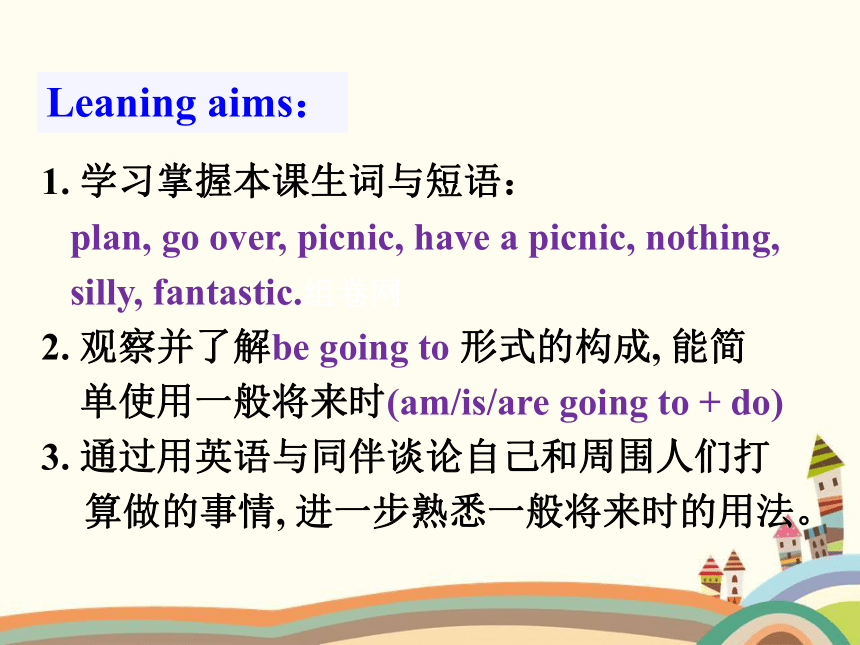
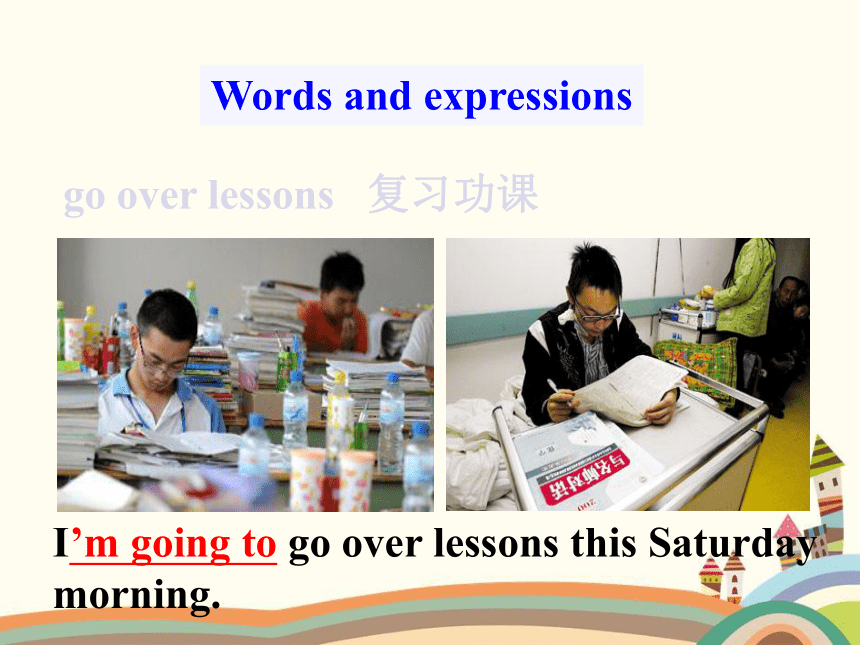
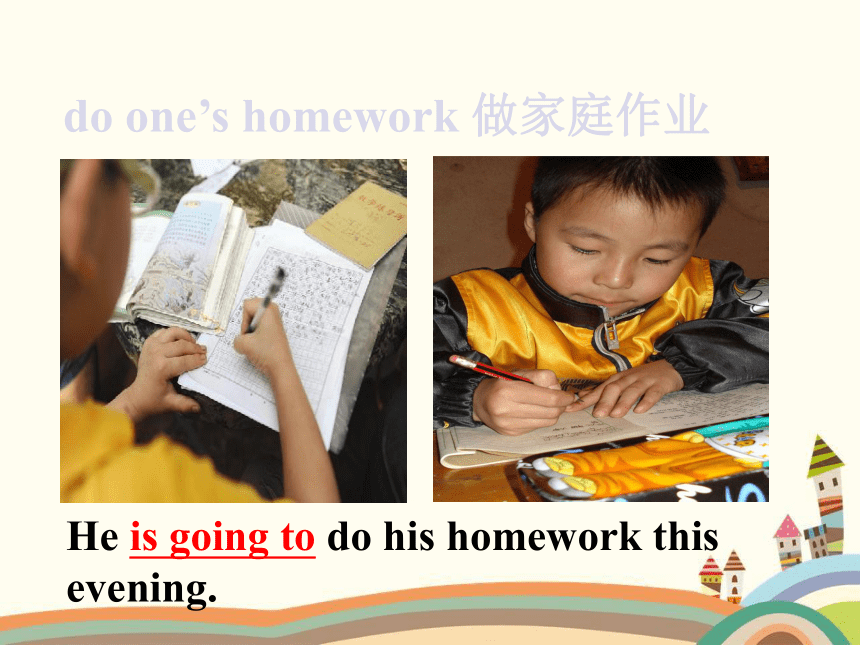
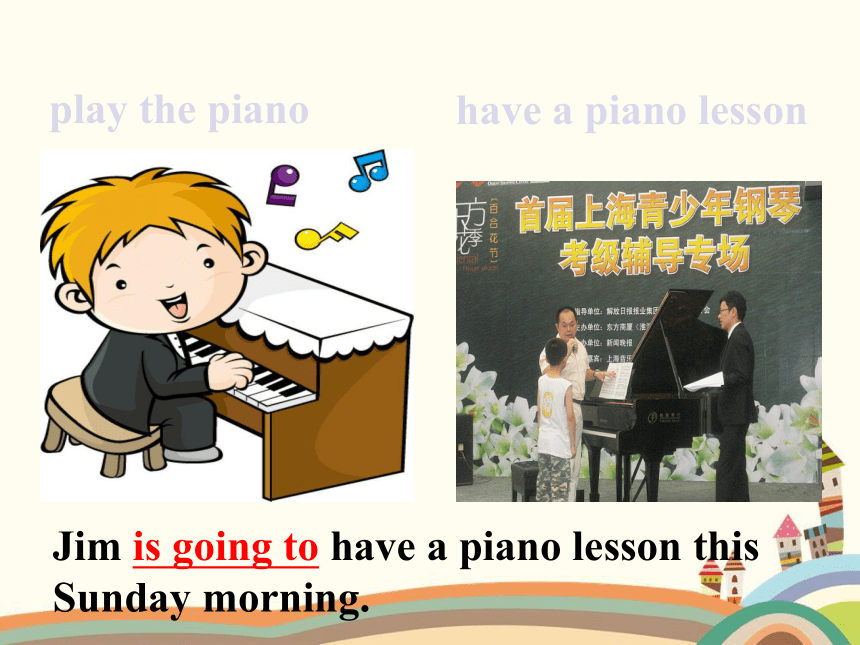



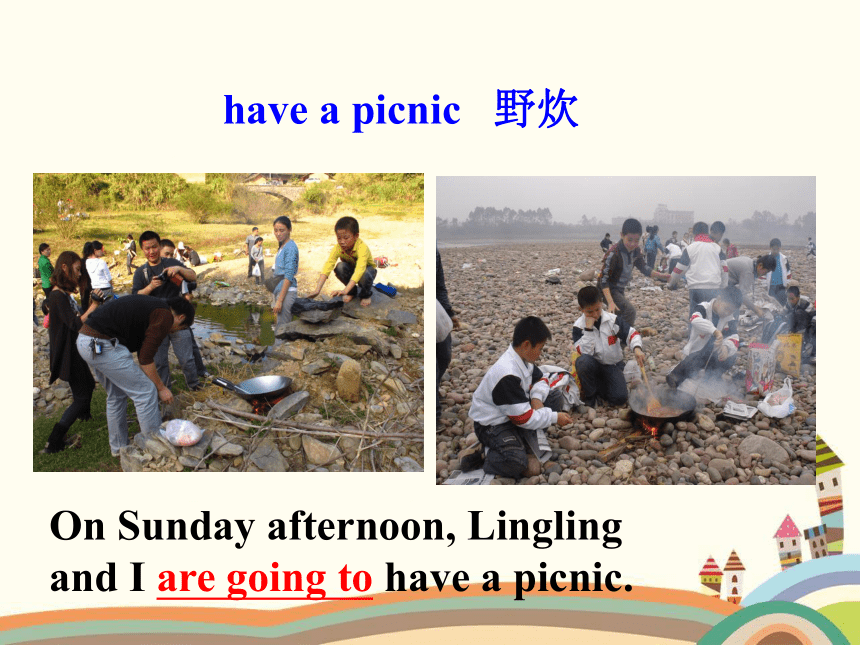

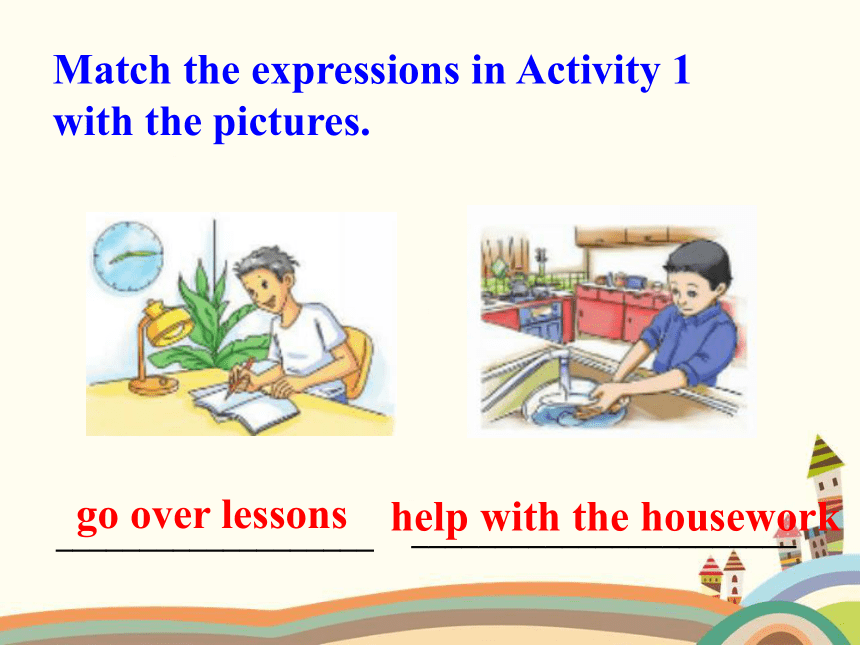
文档简介
(共37张PPT)
Module 3
Making plans
What are you going to do at the weekend
Unit 1
1. 学习掌握本课生词与短语:
plan, go over, picnic, have a picnic, nothing,
silly, fantastic.组卷网
2. 观察并了解be going to 形式的构成, 能简
单使用一般将来时(am/is/are going to + do)
3. 通过用英语与同伴谈论自己和周围人们打
算做的事情, 进一步熟悉一般将来时的用法。
Leaning aims:
go over lessons 复习功课
I’m going to go over lessons this Saturday morning.
Words and expressions
do one’s homework 做家庭作业
He is going to do his homework this evening.
have a piano lesson
play the piano
Jim is going to have a piano lesson this Sunday morning.
help with the housework 帮助做家务
Bill is going to help his mother with the housework this Saturday morning.
check one’s email 查某人的电子邮件
On Saturday morning, my mother is going to check her email.
see a movie 看电影
Betty is going to see a movie in the afternoon.
have a picnic 野炊
On Sunday afternoon, Lingling and I are going to have a picnic.
Listen and match the words and expression from Box A with the word and expressions from Box B.
check
go over
have
see
help
have
a movie
a piano lesson
a picnic
lessons
my email
with the housework
A
B
Match the expressions in Activity 1 with the pictures.
___________________
_______________________
go over lessons
help with the housework
___________________
___________________
check my email
see a movie
___________________
___________________
have a piano lesson
have a picnic
3. Listen and read
Betty: What are you going to do at the weekend,
Daming
Daming: On Saturday morning, I’m going to check my email and do my homework. Then I’m going to help with the housework. What are you going to do Betty
Betty: I’m going to see a movie in the afternoon . You can come too.
Daming: Sure! Who else is going to be there
Betty: Nobody. Lingling is going to have a piano lesson, so she can’t come with us, but on Sunday afternoon , Lingling and I are going to have a picnic. Would you like to join us
Daming: Yes. I’d love to. Are we going to meet here
Betty: No. we aren’t. We’re going to meet in the park at one o’clock.
Tony: Hi, everyone!
Betty: Hi ,Tony. What are your plans for the weekend
Tony: Nothing. I’m going to stay at home alone.
Betty: Don’t be silly! You’re going to come with us. It's going to be a fantastic weekend!
1. What’s Daming going to do on
Saturday morning
He is going to check his email, do his homework and help with the housework.
Now answer the questions.
2. What’s Betty going to do on Saturday
afternoon
3. Who is going to have a piano lesson on
Saturday
She is going to see a movie on Saturday afternoon.
Lingling is going to have a piano lesson on Saturday.
4. Where are they going to have a picnic
They are going to have a picnic in the park.
Would you like to join us
Don’t be silly!
Everyday English
Complete the conversation with the correct form of the words from the box.
alone else fantastic nothing silly
Betty: What are your plans for next weekend, Lingling
Lingling: (1)________. I don’t have any plans.
Betty: Are you going to spend it (2)_____ at home
Nothing
alone
Lingling: Well, …what are you going to do
Betty: Tony and I are going to have a picnic in the park. We’re going to have a (3)________ time. Are you going to come
Lingling: I’m not sure.
Betty: Don’t be (4)____! What (5)____ are you going to do
fantastic
silly
else
hi I like time
picnic with
police
my
Listen and repeat.
Ask and answer questions about your plans at the weekend.
— What are you going to do on
Saturday morning
— I’m going to check my email
and do my homework.
6. Work in pairs.
Now complete the diary.
You Your partner
Saturday morning check email
do homework
afternoon
evening
Sunday morning
afternoon
evening
1. On Saturday morning, I’m going to check my email and do my homework.周六上午我打算查看电子邮件并写作业。
I’m going to see a movie in the afternoon. 我打算下午去看电影。
Language points
如果我们要表达“在上午、下午、晚上”,可以说in the morning / evening / afternoon 三个词也常跟介词in连用。例如:
Don't watch TV too much in the evening. 晚上看电视不要太多。
They sometimes play games in the afternoon. 他们有时在下午做游戏。
但如果特指“在具体的某一天”或“(在具体的某一天的)上午、下午、晚上”等,须用介词on。例如:
I’ll see you on Monday morning.
周一上午见。
She always goes to see a film on Friday evening.
她总是周五晚上去看电影。
中考链接:
1. —When did your uncle arrive ______ China
—He got to Guangzhou _______the morning of the 16th of April. (2011广东广州)
A. at; in B. in; in C. to; on D. in; on
D
2.—When did the fire take place
—It took place __________ Sunday morning. (2012广东湛江)
A.on B.at C.in D.of
A
2. …but on Sunday afternoon, Lingling and I are going to have a picnic. ……但是星期日下午玲玲和我要去野餐。
have a picnic“去野餐”。在英语中,经常用have + n. 组成词组,例如:
have a look at 看一看
have breakfast / lunch / supper 吃早/午/晚饭
have classes / lessons 上课
have a meeting 开会
have a rest 休息一会儿
一、翻译下列短语:
1. 查电子邮件 _____________________
2. 复习功课 _____________________
3. 上钢琴课 _____________________
4. 看电影 _____________________
5. 帮助做家务 _____________________
6. 野炊 _____________________
check my email
go over lessons
have a piano lesson
see a movie
help with the housework
have a picnic
练习
二、完成句子:
1. 我打算在早上查看一下电子邮件。
I __________________ my email in the morning.
2. 他打算在周末去野餐。
He ____________________ at the weekend.
am going to check
is going to have a picnic
3. 我们不打算星期六去看电影。
We _______________________ on Saturday.
4.—你打算在下午做作业吗?
—是的。
—____ you _______ do your homework
—Yes , I ___.
aren’t going to see a movie
Are going to
am
5. 他打算在周末做什么?
_______he ____________ at the weekend
6. 他们打算什么时候复习功课?
_________ they ____________________
What’s going to do
When are going to go over lessons
Module 3
Making plans
What are you going to do at the weekend
Unit 1
1. 学习掌握本课生词与短语:
plan, go over, picnic, have a picnic, nothing,
silly, fantastic.组卷网
2. 观察并了解be going to 形式的构成, 能简
单使用一般将来时(am/is/are going to + do)
3. 通过用英语与同伴谈论自己和周围人们打
算做的事情, 进一步熟悉一般将来时的用法。
Leaning aims:
go over lessons 复习功课
I’m going to go over lessons this Saturday morning.
Words and expressions
do one’s homework 做家庭作业
He is going to do his homework this evening.
have a piano lesson
play the piano
Jim is going to have a piano lesson this Sunday morning.
help with the housework 帮助做家务
Bill is going to help his mother with the housework this Saturday morning.
check one’s email 查某人的电子邮件
On Saturday morning, my mother is going to check her email.
see a movie 看电影
Betty is going to see a movie in the afternoon.
have a picnic 野炊
On Sunday afternoon, Lingling and I are going to have a picnic.
Listen and match the words and expression from Box A with the word and expressions from Box B.
check
go over
have
see
help
have
a movie
a piano lesson
a picnic
lessons
my email
with the housework
A
B
Match the expressions in Activity 1 with the pictures.
___________________
_______________________
go over lessons
help with the housework
___________________
___________________
check my email
see a movie
___________________
___________________
have a piano lesson
have a picnic
3. Listen and read
Betty: What are you going to do at the weekend,
Daming
Daming: On Saturday morning, I’m going to check my email and do my homework. Then I’m going to help with the housework. What are you going to do Betty
Betty: I’m going to see a movie in the afternoon . You can come too.
Daming: Sure! Who else is going to be there
Betty: Nobody. Lingling is going to have a piano lesson, so she can’t come with us, but on Sunday afternoon , Lingling and I are going to have a picnic. Would you like to join us
Daming: Yes. I’d love to. Are we going to meet here
Betty: No. we aren’t. We’re going to meet in the park at one o’clock.
Tony: Hi, everyone!
Betty: Hi ,Tony. What are your plans for the weekend
Tony: Nothing. I’m going to stay at home alone.
Betty: Don’t be silly! You’re going to come with us. It's going to be a fantastic weekend!
1. What’s Daming going to do on
Saturday morning
He is going to check his email, do his homework and help with the housework.
Now answer the questions.
2. What’s Betty going to do on Saturday
afternoon
3. Who is going to have a piano lesson on
Saturday
She is going to see a movie on Saturday afternoon.
Lingling is going to have a piano lesson on Saturday.
4. Where are they going to have a picnic
They are going to have a picnic in the park.
Would you like to join us
Don’t be silly!
Everyday English
Complete the conversation with the correct form of the words from the box.
alone else fantastic nothing silly
Betty: What are your plans for next weekend, Lingling
Lingling: (1)________. I don’t have any plans.
Betty: Are you going to spend it (2)_____ at home
Nothing
alone
Lingling: Well, …what are you going to do
Betty: Tony and I are going to have a picnic in the park. We’re going to have a (3)________ time. Are you going to come
Lingling: I’m not sure.
Betty: Don’t be (4)____! What (5)____ are you going to do
fantastic
silly
else
hi I like time
picnic with
police
my
Listen and repeat.
Ask and answer questions about your plans at the weekend.
— What are you going to do on
Saturday morning
— I’m going to check my email
and do my homework.
6. Work in pairs.
Now complete the diary.
You Your partner
Saturday morning check email
do homework
afternoon
evening
Sunday morning
afternoon
evening
1. On Saturday morning, I’m going to check my email and do my homework.周六上午我打算查看电子邮件并写作业。
I’m going to see a movie in the afternoon. 我打算下午去看电影。
Language points
如果我们要表达“在上午、下午、晚上”,可以说in the morning / evening / afternoon 三个词也常跟介词in连用。例如:
Don't watch TV too much in the evening. 晚上看电视不要太多。
They sometimes play games in the afternoon. 他们有时在下午做游戏。
但如果特指“在具体的某一天”或“(在具体的某一天的)上午、下午、晚上”等,须用介词on。例如:
I’ll see you on Monday morning.
周一上午见。
She always goes to see a film on Friday evening.
她总是周五晚上去看电影。
中考链接:
1. —When did your uncle arrive ______ China
—He got to Guangzhou _______the morning of the 16th of April. (2011广东广州)
A. at; in B. in; in C. to; on D. in; on
D
2.—When did the fire take place
—It took place __________ Sunday morning. (2012广东湛江)
A.on B.at C.in D.of
A
2. …but on Sunday afternoon, Lingling and I are going to have a picnic. ……但是星期日下午玲玲和我要去野餐。
have a picnic“去野餐”。在英语中,经常用have + n. 组成词组,例如:
have a look at 看一看
have breakfast / lunch / supper 吃早/午/晚饭
have classes / lessons 上课
have a meeting 开会
have a rest 休息一会儿
一、翻译下列短语:
1. 查电子邮件 _____________________
2. 复习功课 _____________________
3. 上钢琴课 _____________________
4. 看电影 _____________________
5. 帮助做家务 _____________________
6. 野炊 _____________________
check my email
go over lessons
have a piano lesson
see a movie
help with the housework
have a picnic
练习
二、完成句子:
1. 我打算在早上查看一下电子邮件。
I __________________ my email in the morning.
2. 他打算在周末去野餐。
He ____________________ at the weekend.
am going to check
is going to have a picnic
3. 我们不打算星期六去看电影。
We _______________________ on Saturday.
4.—你打算在下午做作业吗?
—是的。
—____ you _______ do your homework
—Yes , I ___.
aren’t going to see a movie
Are going to
am
5. 他打算在周末做什么?
_______he ____________ at the weekend
6. 他们打算什么时候复习功课?
_________ they ____________________
What’s going to do
When are going to go over lessons
同课章节目录
- Module 1 Lost and found
- Unit 1 Whose bag is this?
- Unit 2 Are they yours?
- Unit 3 Language in use
- Module 2 What can you do ?
- Unit 1 I can play the piano
- Unit 2 I can run really fast
- Unit 3 Language in use
- Module 3 Making plans
- Unit 1 What are you going to do at the weekends?
- Unit 2 We're going to cheer the players.
- Unit 3 Language in use
- Module 4 Life in the future
- Unit 1 Everyone will study at home
- Unit 2 Every family will have a small plane.
- Unit 3 Language in use
- Module 5 Shopping
- Unit 1 What can I do for you?
- Unit 2 You can buy everything on the Internet
- Unit 3 Language in use
- Module 6 Around town
- Unit 1 Could you tell me how to get to the Nationa
- Unit 2 The London Eye is on your right.
- Unit 3 Language in use
- Revision module A
- Module 7 My past life
- Unit 1 I was born in a small village.
- Unit 2 I was born in Quincy.
- Unit 3 Language in use
- Module 8 Story time
- Unit 1 Once upon a time….
- Unit 2 Goldilocks hurried out of the house.
- Unit 3 Language in use
- Module 9 Life history
- Unit 1 He left school and began work at the age of
- Unit 2 He decided to be an actor.
- Unit 3 Language in use
- Module 10 A holiday journey
- Unit 1 What did you do?
- Unit 2 This morning we took a walk.
- Unit 3 Language in use
- Module 11 Body language
- Unit 1 They touch noses!
- Unit 2 Here are some ways to welcome them.
- Unit 3 Language in use
- Module 12 Western music
- Unit 1 It's so beautiful!
- Unit 2 Vienna is the centre of European classical
- Unit 3 Language in use
- Revision module B
